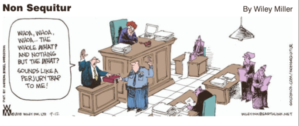Udren Law Firm Disappears
Posted by Cliff Tuttle| October 4, 2018 | © 2026
No. 1,564
If you have dealings with the Udren Law Firm, headquartered in Short Hills, New Jersey, you may have a problem. The phones are disconnected and communications directed to the firm’s email address bounce back. They just aren’t there anymore.
This firm used to handle a large volume of mortgage foreclosures and related matters throughout Pennsylvania, including Allegheny County. In all probability, some other law firms will begin entering appearances in their cases. But for the present, there appears to be no one to contact.
The Legal Intelligencer of Philadelphia reports that the firm has defaulted in payment of bills for legal advertising related to foreclosures and speculates that it will be filing a bankruptcy petition. It also speculates that this development is the result of the decision of the Pennsylvania Supreme Court in the case of Glover v. Udren Law Offices, PC, 139 A.3d 195 (2016). This case held that a law firm representing a residential mortgage lender that charges excessive attorney’s fees to a delinquent borrower for pre-suit activity under Pennsylvania Act 6 would be liable for statutory damages, including attorneys’ fees and treble damages. That case was filed as class action and, according to the Legal Intelligencer, may have created wipeout liability.
CLT
Sunday Morning Meditation
Posted by Cliff Tuttle| September 30, 2018 | © 2026
No. 1,563
Gratitude
I resolve to be aware of how lucky I have been in life. I am grateful to be alive and physically and mentally strong today. I am grateful for the gift of my family.
Compassion
I resolve to listen to and observe others today without judgment. I resolve to be a friend. I resolve to share my knowledge and experience with someone who asks. I resolve to take the time to do something today for someone in need. I resolve to pay someone I encounter today a deserved compliment.
Pride
I resolve to spend this day in a way that I can be justly proud. I don’t know much about the future, but I do know that it begins today.
CLT
P-G Editorializes Regarding Court Costs in Landlord Tenant cases
Posted by Cliff Tuttle| September 24, 2018 | © 2026
No. 1,562
The Post-Gazette, which has been running articles about landlord-tenant cases at the Magisterial level, states that the court costs, which are about $150, are a burden on the poor, especially those about to be homeless. To clarify, the landlord pays the costs when filing the case. When a judgment is entered in favor of the landlord, these costs are also awarded as part of the judgment, to be repaid by the tenant to the landlord — not the court. But the editorial fails to mention that the landlord who evicts a tenant rarely even attempts to collect money damages. Most landlords simply absorb the court fee as a cost of doing business.
The suggestion by the P-G that the tenant should be permitted to pay costs in installments or by working it off apparently assumes that this payment is being made to the court. The situation posed in the editorial, that the tenant can pay the delinquent rent but not the costs, is in my experience, a rarity.
The editorial’s allegation that the average length of such a hearing is three minutes could only be possible by counting cases where one party does not appear or concedes at the start. In my experience, a contested case takes approximately 30 minutes. If a strong defense is presented, it can take an hour or more. Magistrates will listen to a defendant who has something meaningful to say. But bear in mind, they have heard it all before and can pick up the gist of your case rather quickly. If you come prepared with copies of documents and pictures — and you get to the point — the Magistrate will take the time to hear your defense.
The article also fails to note that the tenant can stay in the property and postpone the payment of those costs by appealing to Common Pleas Court. This appeal can be made without a payment of further costs by obtaining a court order certifying that he tenant is qualified under the applicable rules. These orders are rarely refused when requested at motions court, supported by the affidavit of the defendant. The tenant must pay one-third of one month’s rent into escrow at time of filing and the 2/3 balance of one month’s rent in 20 days. Thereafter, one month’s rent is paid into escrow on the day of the month when the appeal was filed. If the tenant wins the case on appeal, and some do, the escrow funds can be claimed by the tenant. If the tenant loses the case, they are offset against amounts awarded to the landlord. There can be a further appeal to a judge with a continuation of the escrow. Of course, the tenant must successfully present a defense to win the case. Most often this involves the uninhabitability of the premises and the refusal of the landlord to make the needed repairs.
The editorial calls for change in the Landlord and Tenant Act to relieve the burden of court costs, but is apparently leaving the nature of this change to the experts. Perhaps the solution could be the waiver by the landlord of the reimbursement of the initial filing fee if the account is brought fully current within ten days or the premises are voluntarily surrendered in good condition without need of further legal action.
To read the editorial, click the link below:
The Strangest #Me Too Case Yet.
Posted by Cliff Tuttle| September 22, 2018 | © 2026
No. 1,561
If Judge Kavenaugh had never been nominated to the Supreme Court, no one would have heard the accusations made by Dr. Ford. She is stepping forward only because he was nominated to the Supreme Court and is about to be confirmed by the Senate.
She says she didn’t tell her parents about the sexual assault at the time because she obviously wasn’t supposed to be at a drinking party. They would probably have grounded her for that and for sneaking around and for getting drunk. And justly so.
But there was more to her motivation. Accusations of this kind don’t usually come to light unless the police become involved or worse. Even today, young girls are unwilling to report events like this because they fear being branded by society as “that kind of girl.” She would have been the big loser and she knew it.
Fast forward to 2018. Its now the era of #Me Too. Women make the cover of Time Magazine and are called heroines for outing bosses and other men in power as adult sexual predators. These cases follow a pattern where the accuser’s entire career was at stake. If she resisted, she feared being blackballed.
With the Ford/Kavenaugh matter, the #Me Too revolution is evolving to a new and frightening stage. The key elements of the classic #Me Too scenario are missing. According to Dr Ford’s story, he was a 17 year old and she was 15. They were both underaged drinkers and drunk. There was no threat of retribution involving career or employment. Ironically, the only career that is in danger is the nominee’s.
Until now, #Me Too accusations involved only public shaming. If an accusation lead to a subsequent prosecution, as some did, the accused was afforded all of the rights under our Constitution and the judicial system. But the hearings before the Senate Judiciary Committee are not just a public shaming. They are in reality a high-stakes trial. This one deserves to be treated as such.
If this proceeding lacks due process, the shame will be on the members of the Committee. That doesn’t mean that it should be conducted with all of the formalities and evidentiary rules required in a criminal case. We apply the constitutional concept of due process to administrative proceedings of all kinds as a matter of course. But, at the minimum, it does mean that the accused is entitled to hear live testimony of the accuser, together with the right to test the truth of the allegations by cross examination. The accuser’s suggestion that the nominee must testify first and not be present during her subsequent testimony is contrary to our tradition of fundamental fairness and due process. Nor does it make any sense. Until she testifies under oath in a formal hearing, there is nothing to deny.
At the time of this posting, it is not clear whether Dr Ford will ultimately choose to appear before the committee. Her lawyers are still negotiating with Chairman Grassley regarding the rules. In the end, she will probably appear “under protest”, possibly claiming that the game was rigged against her.
CLT
Shooting in the Court
Posted by Cliff Tuttle| September 20, 2018 | © 2026
No. 1,560
 The shooting at the Magisterial District Judge’s Office in Masontown underlines the exceptional vulnerability of these venues. Typically, an entire morning or afternoon of cases will be scheduled for one time and twenty or more people will be crowded into a small waiting room. A shooter who plans to do so could easily kill all or most of them, since everyone would be at close range.
The shooting at the Magisterial District Judge’s Office in Masontown underlines the exceptional vulnerability of these venues. Typically, an entire morning or afternoon of cases will be scheduled for one time and twenty or more people will be crowded into a small waiting room. A shooter who plans to do so could easily kill all or most of them, since everyone would be at close range.
I’ve been to a few Magisterial Offices where the litigants are checked for weapons by a constable with a wand. Most offices don’t, at least not until now. It would not surprise me to see that situation changing abruptly. One or more constables are usually on hand when the court is in session. It probably would not increase the operating cost of the court very much.
Some of the offices that currently do screening let people enter the waiting room freely and check them as they enter the court room. That is not good enough. As we saw at Masontown, the waiting room and even the corridor can be dangerous. Screening should be performed at the front door. Even that procedure is not foolproof, since the shooter could enter the building with a gun held under his coat and surprise the guard. If necessary, a higher level of security might be afforded by the glass enclosure installed in the doorway by some banks where each person is briefly locked inside until cleared to proceed.
Our experience since 2001 has proven that there are would-be terrorists who look for such opportunities and will plan a killing spree carefully. We cannot afford to continue to provide such an attractive target, especially after its vulnerability has been demonstrated so clearly.
I am assuming that a full-sized screening station, complete with an x-ray to examine briefcases and bags, as they have at the County courthouses and the City Courts downtown, would be too expensive to provide and to staff in neighborhood magistrate offices. But an armed constable with a wand and a panic button would be a step in the right direction.
CLT
Story Telling
Posted by Cliff Tuttle| September 20, 2018 | © 2026
No. 1,559
 I’m reading (actually listening to) a new book by one of my favorite biographers, Doris Kearns Goodwin. It is titled “Leadership in Turbulent Times”. Goodwin has been writing books about Presidents Abraham Lincoln, Theodore Roosevelt, Franklin Roosevelt and Lyndon Johnson for fifty years. This one draws upon a lifetime of study to focus on the components of great leadership.
I’m reading (actually listening to) a new book by one of my favorite biographers, Doris Kearns Goodwin. It is titled “Leadership in Turbulent Times”. Goodwin has been writing books about Presidents Abraham Lincoln, Theodore Roosevelt, Franklin Roosevelt and Lyndon Johnson for fifty years. This one draws upon a lifetime of study to focus on the components of great leadership.
All of them were great communicators. One characteristic they all shared was that they were all superb storytellers. The stories they told from the podium fascinated listeners. They were remembered, repeated in the newspaper, quoted in books. They were often funny, disarmingly so. They were usually instructive. They didn’t require much education of the listener. And they came naturally.
We lawyers are in the business of persuasion. Unfortunately, our audience is sometimes predisposed to reject the message we are trying to communicate. They can also be already bored and tune you out before you even start.
And so you have to wake ’em up and, if appropriate, get ’em laughing. At least, you must be interesting. Your presentation should be conversational, not oratorical. As LBJ instructed the high school debaters he coached, you look one of them in the eye, talk to that person for a little while and then look somebody else in the eye.
When you are discussing the facts of your case, tell them in the form of a story. When you are discussing a another case in your brief that you want to rely upon as precedent, tell the facts in the form of a story, too.
A well-told story can be disarming. When Lincoln had removed his Secretary of War for profiteering, he was besieged by demands to fire other members of the cabinet. He responded with a story about an Illinois farmer who discovered a pack of skunks in the hen house. “I shot one”, the farmer said. “But the stench was so bad, that I figured that one was enough.”
CLT
On Blogging.
Posted by Cliff Tuttle| September 14, 2018 | © 2026
No. 1,558
 JACK SEZ: Writing a blog post is like sending a message out to sea in a bottle. You never know if anybody will ever read it or who the reader might be.
JACK SEZ: Writing a blog post is like sending a message out to sea in a bottle. You never know if anybody will ever read it or who the reader might be.
Job Shaming for Lawyers
Posted by Cliff Tuttle| September 14, 2018 | © 2026
No. 1,557

Image: freedomringsnews
The former TV actor who played the son on the Cosby Show, Geoffrey Owen, was photographed bagging groceries at Trader Joe’s and publicly humiliated in the world media. But he courageously turned the situation around when he was interviewed on the national news. Any job is a good job, he stated. He turned the shame onto the shamers — exposed them for the mean, petty people that they are. In his case, this unsought publicity resulted in an acting job on NCIS New Orleans. An apparent calamity can sometimes turn into an opportunity. When called for a TV interview, he was ready and grabbed that brass ring.
Once in a while, I encounter a credentialed lawyer who is struggling after a year or more to enter the profession. It is always an embarrassment for both of us. I feel their fear and frustration and humiliation by proxy, but only for a short while. They feel it all of the time, especially during sleepless nights and during social events that cannot be avoided.
Graduation from law school is a daunting task. It is a strenuous intellectual exercise spanning at least three years and it costs a lot of money. After that, there is admission to the bar.
Just accomplishing all of that is something to be proud of, no matter what the future holds. But, for a long time our law schools have been producing a surplus of new lawyers compared to the ability of the marketplace to absorb them.
To you, my brother and sister lawyers who are still looking for a real job, be aware that you have more friends than you think. Stop believing that its your own fault. You were good enough to get this far and with a bit of luck and persistence you can make the next step. I know you’ve heard this before. Maybe you’ve even told it to yourself. But do you truly believe it?
Don’t hide. Do what other lawyers have to do to get clients. Do it all day, every day. Join church and community organizations. Volunteer. Go to every bar association event you can. After a short while, the fear will go away.
Practice your elevator speech. Be interesting. Be proud of who you are. When the opportunity comes, and it will, shine.
CLT
In Case You Don’t Read the Newspaper Anymore . . .
Posted by Cliff Tuttle| September 12, 2018 | © 2026
No. 1,556

Landlord & Tenant: Enhanced Voucher Rental Assistance and the Perpetual Lease.
Posted by Cliff Tuttle| September 10, 2018 | © 2026
No. 1,555
“The Hayes family receives enhanced voucher rental assistance from the federal government, and a federal statute provides that enhanced voucher holders “may elect to remain” in their housing developments, even after their landlord has opted out of the federal housing assistance program. 42 U.S.C. § 1437f(t)(1)(B). But the Hayes family’s landlord, Appellee Philip Harvey, contends that this statutory right to “elect to remain” does not apply at the end of a lease term. Thus, according to Harvey, he is permitted to evict the Hayes family without cause once their lease has expired. The District Court agreed and granted Harvey’s motion for summary judgment. We will reverse, however, because the statute’s plain language and history make evident that enhanced voucher holders may not be evicted absent good cause, even at the end of a lease term.”
Click the link on the case name above to read why a landlord with a tenant in the enhanced voucher rental assistance program cannot be evicted, except for good cause. You might want to look at Judge Michael Fisher’s dissent in which he claims that the “clear language” of the statute isn’t so clear. This case was decided after reargument before the court en banc. If you are a Pennsylvania landlord or tenant in the enhanced voucher program, its the law — unless the US Supreme Court says otherwise.
CLT
« go back — keep looking »



